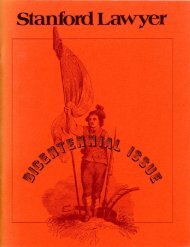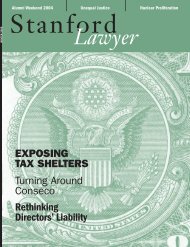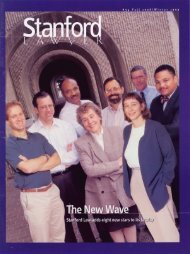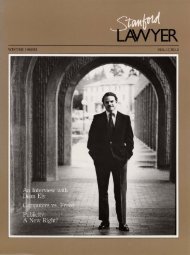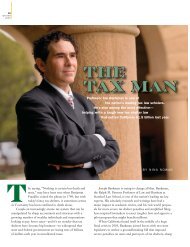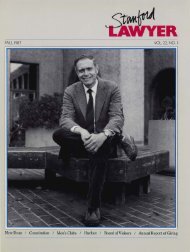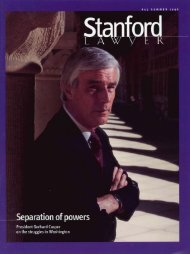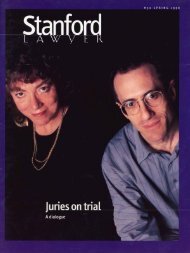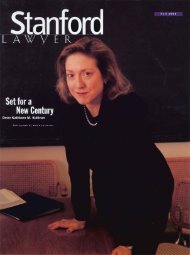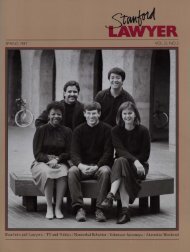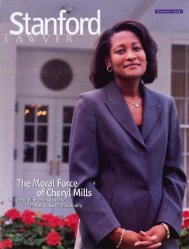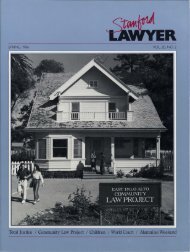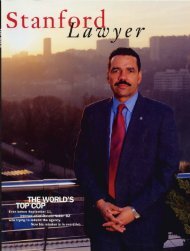Issue 73 - Stanford Lawyer - Stanford University
Issue 73 - Stanford Lawyer - Stanford University
Issue 73 - Stanford Lawyer - Stanford University
Create successful ePaper yourself
Turn your PDF publications into a flip-book with our unique Google optimized e-Paper software.
BRIEFS 5<br />
STANFORD<br />
LAWYER<br />
CITES<br />
“The lesson to be drawn from the Vioxx<br />
case is that if the Vioxx award is writ<br />
large, it will probably do more harm to<br />
consumers than good—presumably not<br />
the intention of the Vioxx jury.”<br />
—A. MITCHELL POLINSKY, Josephine Scott Crocker Professor of Law and Economics, writing<br />
in the August 23 issue of The Boston Globe. Polinsky co-authored the column, “Vioxx<br />
Verdict’s Dark Side,” with Harvard Law School professor Steven Shavell. In the op-ed<br />
Polinsky and Shavell argued that the $253 million jury award against Merck & Company<br />
Inc. could cause pharmaceutical firms to increase the price of drugs, halt the development<br />
of some new drugs, and withdraw existing drugs from the market.<br />
“The reason we’re allocating dollars to this<br />
sector (alternative energy) is we think we can<br />
deliver attractive returns. . . . When you’re<br />
talking about energy, when you’re talking<br />
about water, you’re talking about the largest<br />
markets in the world.”<br />
—IRA EHRENPREIS JD/MBA ’95, general partner at the venture capital firm Technology Partners<br />
in Palo Alto, California, as quoted in The New York Times. The June 22 article, “Green Tinge<br />
Is Attracting Seed Money to Ventures,” surveyed the reasons venture capital firms are investing<br />
more money in alternative energy companies. His firm invests roughly half of its money in<br />
alternative energy startups.<br />
Michael Jackson is “so extra-planetary, so bizarre,” that the<br />
jury may have believed his claim that he slept with boys without<br />
doing anything illegal. “If a jury viewed<br />
Michael Jackson as simply a rather aberrant<br />
type of human being, that could work to his<br />
benefit or detriment, and maybe this time<br />
that’s what worked to his benefit.”<br />
PHOTO: MISHA BRUK<br />
PHOTO: STEVE GLADFELTER<br />
—ROBERT WEISBERG ’79, Edwin E. Huddleson, Jr. Professor of Law, as<br />
quoted in Bloomberg. The June 13 article, “Michael Jackson Cleared of Child Molestation<br />
Charges,” explored the reasons the pop music star was acquitted.<br />
“The death of King Fahd this week is not likely<br />
to lead to greater freedom and serious democratic<br />
reform, in part because of the Bush administration’s<br />
unwillingness to alter its approach.”<br />
—J.P. SCHNAPPER-CASTERAS ’08, writing in the August 3 issue of The<br />
Philadelphia Inquirer. Schnapper-Casteras, who was a research associate<br />
at the Center for American Progress, co-authored the column with Brian Katulis, director of<br />
democracy and public diplomacy on the national security team at the center. In the op-ed,<br />
“House of Sand and Oil: Saudi Succession Is Our Chance to Kick Our ‘Tyrant Addiction,’”<br />
Schnapper-Casteras and Katulis argued that the Bush administration needs to push more<br />
aggressively for democratic reforms in Saudi Arabia.<br />
PHOTO: JOE NETO<br />
PHOTO: LAUREN SHAY<br />
“There<br />
is a small<br />
window of opportunity<br />
here, and<br />
we’re trying to get<br />
people excited about<br />
what could happen.<br />
They’re leaving.<br />
We’re staying. And<br />
it’s time to rebuild.”<br />
—DIANA BUTTU JSM ’00, JSD<br />
’05, legal advisor to Palestinian<br />
National Authority President<br />
Mahmoud Abbas, as quoted in<br />
The New York Times. The August<br />
12 article, “After Decades of<br />
Disappointment, Gazans Are<br />
Preparing to Rejoice,” considered<br />
the future of Gaza as Israel prepared<br />
to close its settlements<br />
and withdraw from the area.<br />
Over time, U.S.<br />
Supreme Court<br />
Justice Sandra Day<br />
O’Connor ’52 (BA<br />
’50) “became a pretty<br />
good barometer of<br />
what people in the<br />
country think the<br />
Constitution means.”<br />
—PAMELA S. KARLAN, Kenneth and<br />
Harle Montgomery Professor of<br />
Public Interest Law, as quoted in<br />
the Los Angeles Times. The July 2<br />
article, “Vacancy on the Supreme<br />
Court,” examined Justice Sandra<br />
Day O’Connor’s role as the swing<br />
vote on many<br />
of the important<br />
issues<br />
that came<br />
before the<br />
Court.<br />
PHOTO: LINDA A. CICERO




